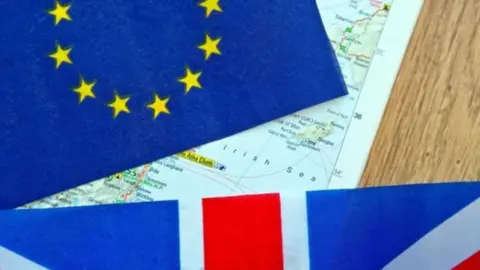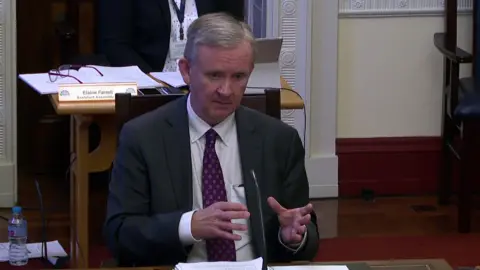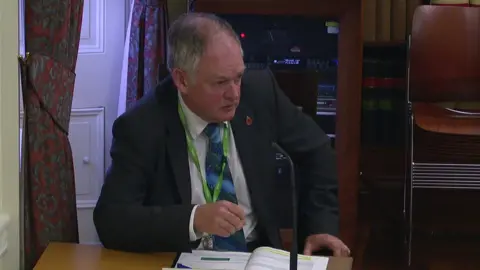Brexit: Irish Sea border will involve checks in NI and Britain
 Getty Images
Getty ImagesThe Irish Sea Brexit border will involve checks in both Britain and Northern Ireland, a Stormont committee has been told.
There will be identity checks on sealed containers in ports like Cairnryan, Heysham and Liverpool.
A small number of lorries arriving off ferries in Northern Ireland will also be physically checked.
Assembly members were told that these were contingency plans which relied on the agreement of the UK and EU.
The details emerged during a briefing of Stormont's agriculture committee by senior officials.
Permanent Secretary Denis McMahon said staff authorised by his department would check sealed containers in English and Scottish ports after the paperwork had been checked online by staff in Larne.
The GB checks would be done by staff from the UK's animal and plant health agency, Border Force or possibly ferry staff, using handheld scanners.

They would examine a seal placed on consignments by a "competent authority" in Great Britain.
Mr McMahon said it was hoped the model would "avoid as far as possible the need to stop lorries coming off the ferries" in Northern Ireland.
"Do the work while they're waiting to get on the ferry," he told MLAs.
He said there would then need to be physical checks on between two and four lorries per sailing in new facilities in Northern Ireland ports.
Some £38m has been made available for permanent port infrastructure to facilitate checks and Mr McMahon revealed that a further £5m had been made available to finance contingency measures while they were being built.
The permanent infrastructure is not expected to be finished until June 2021.
Mr McMahon said it was important that the authorities in Britain ensured that there were sufficient veterinary staff there to complete all the export health plant certificates that would now be needed to facilitate trade across the Irish Sea.
And he said companies based in Great Britain would also have to ensure that they were ready to deal with the necessary paperwork and processes.
But he told MLAs his department had not yet had sight of the government's plans on this "essential element of the process".

Chief Vet Robert Huey said the having the paperwork in place was vital and the new process would not be frictionless.
"Unless we have a certificate, we have nothing to approve," he said.
Mr McMahon also said his contingency planning was working on the assumption that there would be no requirement to check supermarket lorries, but again that was subject to EU/UK agreement.
"Hopefully I have given you some assurance that we're putting everything into this programme. We now need the UK government with the EU, together, to step up to the plate so we can make this work," he told MLAs.
Mr Huey also outlined the staff pressures created by the new arrangements.
He said in order to operate 24/7 at Belfast and Larne about 160 staff would be needed, but recruitment was presenting challenges and some existing staff would need to be redeployed to cover.
MLAs were also told that the 25% of Northern Ireland agri-food which travels to Britain via Dublin would not be covered by the government's commitment to "unfettered access" and it was likely that there would be some diversion of that traffic as a result.
